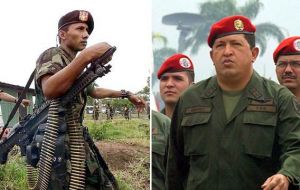MercoPress. South Atlantic News Agency
Chavez lobbying for Colombia's FARC stirs new controversy
 Chavez promotes FARC peace initiative
Chavez promotes FARC peace initiative Venezuelan president Hugo Chavez has stirred up controversy by calling on United States and European governments to stop treating the cocaine funded Colombian rebel groups, which are holding hundreds of hostages, as terrorists.
Just a day after brokering the rare release of two of the hostages, Chavez called on the Americas and Europe to remove FARC and the ELN from their list of terrorist organizations. He told Venezuela's National Assembly: "Although it will bother some people, I say the FARC and the ELN are not terrorist bodies. They are armies, true armies that occupy space in Colombia". Chavez insisted that the FARC and ELN guerrilla movements "were armies with a political project, with a Bolivarian project and should be recognized as such". The Colombian government immediately reacted defending the use of the word "terrorists" to describe the groups, saying they fund their operations with the cocaine trade; they kill civilian population, recruit children and plant land-mines to topple a democratically elected government. The Colombian presidential spokesman said: "They are terrorists because they have only caused massive movements of people, pain, unemployment and poverty". Chavez said he is determined to secure the release of more hostages held by the FARC guerillas and will continue to struggle for peace in what he describes as "Gran Colombia", which under Spanish colonialism was an area that included today's independent countries of Venezuela and Colombia. For the United States, the European Union and Colombia FARC and ELN are terrorist groups. However in the rest of the American hemisphere they are considered "insurgent" groups. "I ask you (Uribe) that we start recognising the FARC and the ELN as insurgent forces in Colombia and not terrorist groups, and I ask the same of the governments of this continent and the world," Mr Chavez said. The Colombian and Venezuelan presidents have been squabbling for months over Mr Chavez's role in trying to mediate swap of hostages for guerrilla prisoners held by Colombia's government. The release of Ms Rojas and Ms Gonzalez was the most important handover in the Colombian conflict since 2001. FARC said the unilateral move showed its willingness to negotiate over remaining hostages. In a release the FARC group said that it was a belligerent force "waiting to be recognized by the governments of the world. This step will help advance in the tortuous path of the people of Colombia in search for peace". Further on FARC insists that "our struggle is legitimate?our father the Liberator Simon Bolivar has taught us that when power oppresses, virtue has the right to crush it". FARC is estimated to have an army of 17.000 foot soldiers and ELN, 5.000 financed with the cocaine trade. Together they occupy and dominate a jungle area in Colombia the size of France close to the border with Venezuela. Venezuela under President Chavez has been repeatedly accused of being the transit area for the FARC cocaine to be shipped to Europe and for the introduction of arms and explosives for the guerrillas. Chavez has only admitted to having a dialogue with the FARC and to have circumscribed his actions to humanitarian efforts such as obtaining the liberation of the two women who had been hostages since 2002. However his success on the liberation seems now to have been tainted with firm suspicions that his relation with the FARC extends to other areas. His strong lobbying for an end to the "terrorist" condition, his description of them as liberation armies with a "Bolivarian" project similar to his own Bolivarian revolution and as was his mention to the Gran Colombia. "With this stance he has turned into the main promoter of FARC interests and closed the doors to any further liberation operations since the elected government of Colombia can't accept such rhetoric", said Colombian political scientists Vicente Torrijos. "The gestures of affection and solidarity with Colombia have been evaporated; Chavez had two options with Colombia: a sensible, humanitarian, mature path or clandestine operations. He seems to have chosen the second", said Torrijos. From Argentina which played a role in the humanitarian effort for the liberation of the two women, diplomatic sources mentioned in the Buenos Aires press said that Argentina will continue to support all humanitarian efforts but will "not make considerations that might be interpreted as interference in (Colombian) domestic politics affairs". Argentina adheres to "what most of the continent argued before the UN Security Council" which is that the groups are "insurgents" and "there are no reasons for Argentina to change its historic policy on the matter". According to the UN a "terrorist" group uses "violence against non combatant civilian population with the purpose of conditioning the State". An "insurgent" group does not have the civilian population as a primary objective. "It plans an organized political challenge; replacing one form of government by another". Argentina's Foreign Affairs minister Jorge Taiana who talked on the phone with the liberated hostages said that "we will not forget those who still are there (hostages) Argentina will continue to contribute and grant all its collaboration and support in the manner which is most effective".




Top Comments
Disclaimer & comment rulesCommenting for this story is now closed.
If you have a Facebook account, become a fan and comment on our Facebook Page!